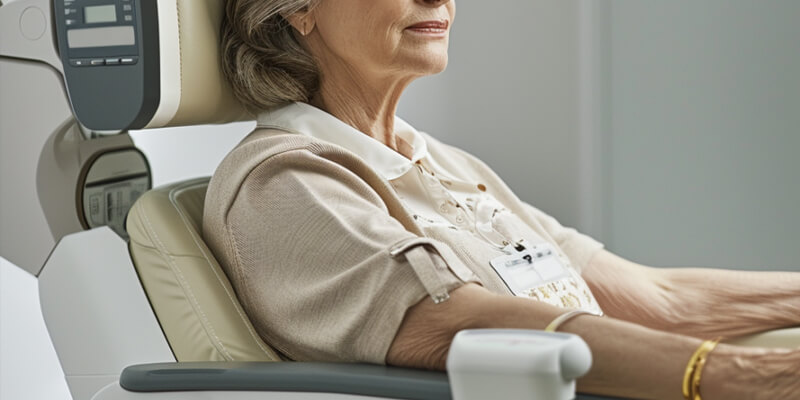About 75% of women feel the symptoms of perimenopause but only a few talk to their doctors. Perimenopause marks the journey to menopause, starting in quiet ways. Watching for slight changes in how your body works is key, not just your age.
This phase shifts your hormone levels, bringing various changes that impact everyday life. It’s important to notice these signs and understand them. By being more aware, women can read these signs better. This leads to a clearer path in dealing with health care.
Key Takeaways
- Understand that a majority of women experience symptoms but may not recognize them as signs of perimenopause.
- Awareness of hormonal transition signs facilitates earlier recognition and management of perimenopause.
- Communication with healthcare providers about perimenopause symptoms can lead to better-informed health decisions.
- Tracking menstrual changes can serve as an invaluable tool in identifying perimenopause.
- Considering lifestyle adjustments and medical options can significantly ease the perimenopausal transition.
Understanding Perimenopause and Its Natural Process
Women in their middle years start experiencing natural hormonal changes. This period is known as perimenopause. It’s a gradual shift toward menopause, happening over 2 to 10 years. During this time, the ovaries work less, affecting ovulation and lowering key hormones like estrogen. These changes lead to less fertility and various signs that the ovaries are slowing down.
Throughout perimenopause, hormone levels can be unpredictable. This can cause symptoms like those in premenstrual syndrome (PMS), but more intense. Women might experience severe hot flashes and trouble sleeping. Understanding these changes is key to handling this crucial time with care and knowledge.
As the journey into menopause begins, recognizing and empathizing with the body’s natural transition becomes crucial for personal well-being, highlighting the importance of education and support during this time.
- Signs of irregular menstrual cycles due to changing ovulation patterns
- Occurrence of hot flashes and night sweats impacting daily life and sleep
- Insights into managing fertility amidst a natural decrease in reproductive hormones
Understanding the menopause transition helps women prepare for upcoming changes. It’s possible through lifestyle tweaks, talking with doctors, or sharing experiences with friends. Embracing these hormonal changes can shift the perimenopause experience from uncertainty to empowerment.
How Do I Know If I Am Perimenopausal?
The path to finding out if you’re entering perimenopause begins with watching your body’s signs. A key step is tracking menstrual changes. These changes can hint at the start of perimenopause. Keeping an eye on your cycle’s regularity and pattern can be revealing.
When monitoring your cycle, pay attention to any unusual shifts. This includes changes in the timing, length, and heaviness of periods. If you notice any big changes, it might be time to talk to a doctor. They might recommend hormone level tests. These tests check your FSH and estrogen, which can show if you’re entering perimenopause.
| Menstrual Observation | Possible Indicators | Action & Evaluation |
|---|---|---|
| Irregular periods | Skipped cycles, varying flow | Consult healthcare provider |
| Shorter cycles | Less than 21 days apart | Consider hormone level screening |
| Longer cycles | More than 35 days apart | Record and track for pattern changes |
| Heavier or lighter bleeding | Change from normal flow | Discuss potential hormonal causes |
Knowing about perimenopause diagnosis means understanding ovulation can be unpredictable. It’s vital to recognize you can still get pregnant during this phase. Therefore, keep using effective birth control until menopause fully starts.
This period of change can be less confusing with symptom tracking and getting medical advice. It helps in making smart health choices and finding care that’s tailored for you.
Changes in Menstruation: A Key Indicator
One of the most obvious signs of hormonal changes is seen in menstrual cycle changes during perimenopause. Many women face period irregularities that can impact their daily life. It’s crucial to pay attention to these changes for health reasons. Understanding changes in menstruation offers insights into the body’s hormonal state during this transition.
Irregular Periods and Varying Flow
Irregular periods are a common sign of perimenopause. Women often see big changes in menstrual flow. These changes can lead to either much lighter or much heavier bleeding than usual. A drop in progesterone levels can make the uterine lining thicker, causing heavier bleeding. These period irregularities are important for understanding reproductive health during perimenopause.
Lengthening Menstrual Cycles
The menstrual cycle length can also increase. The time between periods can get longer, leading to a different timing pattern. Many women experience long gaps, sometimes over 60 days, between periods. This is a clear indicator of the approach of menopause. These unpredictable menstrual cycle changes show the body moving towards a new hormonal balance.
Physical Symptoms of Hormonal Shifts
When women start perimenopause, they face many physical signs. These show the hormonal changes happening in their bodies. These changes can really affect their daily life and happiness.
Hot Flashes and Night Sweats
Hot flashes are very common in perimenopause and menopause. Many women feel a sudden wave of heat from within. This is often with sweating and skin redness. At night, these sweats can mess up sleep, making someone tired and cranky the next day.

Vaginal Dryness and Discomfort
Vaginal atrophy is another tough symptom. It means vaginal tissues get thin, less stretchy, and more easily irritated. It’s because estrogen levels drop. This leads to dryness and pain during sex. Talking to a healthcare provider can help find ways to feel better.
Emotional Symptoms and Cognitive Changes
The journey through perimenopause is not just physical. It also brings emotional and cognitive twists. This hormonal rollercoaster often leads to unexpected mood swings in perimenopause. These can be as hard to deal with as any physical symptom. Emotions vary greatly and can grow stronger with sleep problems and long-lasting PMS.
Mood Fluctuations and Mental Health
Recognizing and addressing mental clarity concerns is crucial during this time. Women may feel more sensitive. They might react more strongly to things than before. These reactions are normal due to the cognitive effects of hormonal changes. Turning to mindfulness, exercise, or art can help balance emotions. These activities offer comfort and stability.
Memory Issues and Lack of Concentration
Cognitive changes, like forgetfulness and concentration troubles, are common. Tasks that used to be easy might now need more thought and effort. This can lead to frustration in both personal and work life. Luckily, these cognitive issues are usually temporary and get better after perimenopause.
| Emotional Symptom | Related Factor | Management Strategy |
|---|---|---|
| Mood Swings | Hormonal Fluctuations | Cognitive Behavioral Therapy |
| Anxiety | Sleep Disruption | Regular Exercise Regimen |
| Depression | Historical PMS | Mindfulness and Support Groups |
| Forgetfulness | Cognitive Overload | Organizational Tools |
The Impact of Perimenopause on Bone Health
During perimenopause, estrogen levels drop and bone density decreases quickly. This shows why it’s key to prevent bone density loss in women’s health. The lack of estrogen, which keeps bones strong, connects estrogen to osteoporosis. Knowing and reducing these risks is crucial for healthy bones later on.
It’s important to keep bones strong through diet and lifestyle. You should eat more calcium and vitamin D, and do weight-bearing exercises. These steps greatly improve bone density. Here’s a simple guide for keeping bones healthy during this important time:
- Nutrient Intake: Eating enough calcium-rich foods and taking vitamin D is key for bone health.
- Exercise: Walking, jogging, or lifting weights helps bones by encouraging growth and keeping bone density.
- Medical Support: Sometimes, doctors may suggest medicine to keep bones strong and prevent more bone loss.
Along with these steps, don’t forget regular checks for bone health. DEXA scans give detailed information on bone density. They help find bone weakness early.
| Nutrient | Daily Recommended Intake | Food Sources |
|---|---|---|
| Calcium | 1,000-1,200 mg | Milk, cheese, yogurt, leafy greens |
| Vitamin D | 600-800 IU | Fatty fish, egg yolks, fortified foods |
Adding these nutrients to your daily diet is a big step in preventing bone density loss. Talking to a doctor to tailor these strategies can be more effective, especially if you’re at higher risk of osteoporosis.

Being proactive in bone density loss prevention during perimenopause not only protects bones from fracture risks now but also ensures strong bones into the post-menopausal years.
In conclusion, it’s vital to understand how perimenopause affects bone health and to use preventative measures. Focusing on the issues of estrogen and osteoporosis and working hard on maintaining bone strength, women can move through perimenopause more confidently about their health later in life.
Lifestyle and Treatment Options to Manage Perimenopause
Women can ease perimenopause symptoms by mixing perimenopause management strategies with wellness. A combination of diet, exercise, and hormone replacement therapy can help. This creates a balanced way to handle this change.
Dietary Considerations and Supplements
Eating nutrient-rich foods is key during perimenopause. Adding fruits, vegetables, and whole grains can support health. It can also ease some hormonal discomfort. Getting enough calcium-rich foods is important for strong bones. Use supplements carefully, as not all are proven effective.
Exercise and Its Benefits
Exercise boosts both physical and mental health. Activities like yoga and cardio reduce hot flashes and improve mood. They also help with sleep. These are all important for wellness strategies during the perimenopausal period.
Medications and Hormone Therapy
Sometimes, lifestyle changes need a boost from medical treatments. Hormone replacement therapy can be effective for bone density and mood. Women should talk to their doctors about the benefits and risks. This helps make the best decisions for their health.
Conclusion
Starting the journey through navigating perimenopause calls for a smart and well-informed plan. The menopausal transition shows itself via physical, emotional, and behavior signs. Knowing these signs helps women act early to reduce negative effects on their day-to-day life.
Changing one’s lifestyle is key in proactive health management during these years. Making small but important changes to diet, exercise, and wellness habits helps ease perimenopause’s challenges. It’s also vital to look into treatment options with doctors, creating a care plan that fits one’s needs and improves well-being.
The perimenopause stage is complex, needing careful attention. With the correct support and information, it becomes easier to deal with. This way, women can keep their health, life quality, and happiness as they go through the changes that mark the end of their reproductive years.
From the Author:
Perimenopause can feel overwhelming, but knowledge is power! I wrote this article to help women understand the changes they’re experiencing and feel confident about managing them. Here’s some additional info:
- Don’t Suffer in Silence: Many women hesitate to discuss these issues, even with their doctor. Don’t! Healthcare providers are there to offer support and solutions.
- Tracking Apps: There are several apps designed specifically for tracking perimenopause symptoms. This helps you gather data to have productive conversations with your doctor.
- It’s NOT All in Your Head: If someone dismisses your concerns as “just menopause,” find a new doctor! Perimenopause is a real physiological change, and you deserve compassionate, informed care.
- Community Matters: Connecting with other women going through this stage can be incredibly helpful. Look for online forums or support groups in your area.
This phase of life can be challenging, but it also signals a new chapter. Let’s embrace the transition and support each other along the way!
FAQ
What are common perimenopause symptoms indicating hormonal transition?
Common perimenopause symptoms include changes in menstrual cycles and mood swings. Women may also experience hot flashes, sleep problems, and vaginal dryness. There can be a drop in sexual desire, plus changes in weight and metabolism.
How does the natural hormonal change process occur during perimenopause?
During perimenopause, women experience a natural decline in ovarian function. This leads to decreased estrogen and progesterone production. Consequently, ovulation becomes less frequent. These changes signal the approach of menopause.
What tests can help diagnose perimenopause?
Diagnosing perimenopause may involve tracking symptoms and menstrual changes. Blood tests for follicle-stimulating hormone (FSH) and estrogen are also useful. They confirm the transition or eliminate other health concerns.
How can I track and manage changes in my menstrual cycle during perimenopause?
To track menstrual changes, keep a detailed journal. Note each period’s length, flow, and any symptoms. Recognizing these patterns can help pinpoint hormonal shifts typical of perimenopause.
What are the treatment options for hot flashes and night sweats?
For hot flashes and night sweats, try lifestyle adjustments. Wear layers, avoid spicy foods, and use fans or cool bedding. Hormone replacement therapy or other medications may also offer relief.
How can I address vaginal dryness during perimenopause?
Over-the-counter lubricants and moisturizers can ease vaginal dryness. Staying sexually active helps, and for severe cases, prescription estrogen creams or rings may be needed.
What are the links between mood swings and perimenopause?
Mood swings in perimenopause relate to changing hormone levels. These fluctuations can impact the brain’s neurotransmitters. Managing the mood swings may involve lifestyle changes and mental health support. In some cases, medication is necessary.
Are there cognitive changes associated with perimenopause?
Cognitive changes, like forgetfulness and difficulty concentrating, can happen. These issues are often due to hormonal changes and sleep disturbances. They typically improve after menopause.
What can I do to prevent bone density loss during perimenopause?
Preventing bone density loss involves several steps. Engage in weight-bearing exercises, consume enough calcium and vitamin D, avoid smoking and limit alcohol. Bone density screenings are also advisable for those at risk of osteoporosis.
How can diet and exercise alleviate perimenopausal symptoms?
A diet rich in fruits, vegetables, and whole grains supports symptom management. Regular exercise boosts overall health, mood, and sleep. Aim for a mix of aerobic and strength-training activities.
Should I consider hormone replacement therapy during perimenopause?
Hormone replacement therapy (HRT) might ease perimenopause symptoms, like severe hot flashes and bone density loss. It’s essential to discuss HRT’s pros and cons with your healthcare provider. HRT isn’t suitable for everyone.
Is there a role for herbal supplements in managing perimenopause?
Some herbal supplements are touted for easing perimenopause symptoms. However, they lack FDA regulation and extensive scientific proof. Always talk to your healthcare provider before starting supplements.





